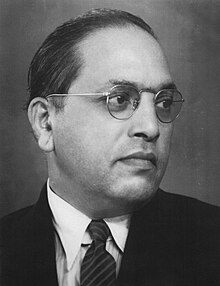 Bhimrao Ramji Ambedkar (14 April 1891 – 6 December 1956), popularly known as Babasaheb, was an Indian jurist, economist, politician and social reformer who inspired the Dalit Buddhist movement and campaigned against social discrimination against Untouchables (Dalits), while also supporting the rights of women and labour.[3][4] He was Independent India's first law minister, the principal architect of the Constitution of India and a founding father of the Republic of India.[5][6][7][8][9]
Bhimrao Ramji Ambedkar (14 April 1891 – 6 December 1956), popularly known as Babasaheb, was an Indian jurist, economist, politician and social reformer who inspired the Dalit Buddhist movement and campaigned against social discrimination against Untouchables (Dalits), while also supporting the rights of women and labour.[3][4] He was Independent India's first law minister, the principal architect of the Constitution of India and a founding father of the Republic of India.[5][6][7][8][9]
Ambedkar was a prolific student, earning doctorates in economics from both Columbia University and the London School of Economics, and gained a reputation as a scholar for his research in law, economics and political science.[10] In his early career he was an economist, professor, and lawyer. His later life was marked by his political activities; he became involved in campaigning and negotiations for India's independence, publishing journals, advocating political rights and social freedom for Dalits, and contributing significantly to the establishment of the state of India. In 1956 he converted to Buddhism, initiating mass conversions of Dalits.[11]
In 1990, the Bharat Ratna, India's highest civilian award, was posthumously conferred upon Ambedkar. Ambedkar's legacy includes numerous memorials and depictions in popular culture.
--------------------------------------------------------------------------
 Navayana (Devanagari: नवयान, IAST: Navayāna) means "new vehicle" and refers to the re-interpretation of Buddhism by B.R. Ambedkar.[1][2] Ambedkar was born in a Dalit (untouchable) family during the colonial era of India, studied abroad, became a Dalit leader, and announced in 1935 his intent to convert from Hinduism to Buddhism.[3] Thereafter Ambedkar studied texts of Buddhism, found several of its core beliefs and doctrines such as Four Noble Truths and "non-self" as flawed and pessimistic, re-interpreted these into what he called "new vehicle" of Buddhism.[4] This is known as Navayana, also known as Bhimayāna after Ambedkar's first name Bhimrao.[4] Ambedkar held a press conference on October 13, 1956, announcing his rejection of Theravada and Mahayana vehicles, as well as of Hinduism.[5][6] Thereafter, he left Hinduism and adopted Navayana, about six weeks before his death.[1][4][5]
Navayana (Devanagari: नवयान, IAST: Navayāna) means "new vehicle" and refers to the re-interpretation of Buddhism by B.R. Ambedkar.[1][2] Ambedkar was born in a Dalit (untouchable) family during the colonial era of India, studied abroad, became a Dalit leader, and announced in 1935 his intent to convert from Hinduism to Buddhism.[3] Thereafter Ambedkar studied texts of Buddhism, found several of its core beliefs and doctrines such as Four Noble Truths and "non-self" as flawed and pessimistic, re-interpreted these into what he called "new vehicle" of Buddhism.[4] This is known as Navayana, also known as Bhimayāna after Ambedkar's first name Bhimrao.[4] Ambedkar held a press conference on October 13, 1956, announcing his rejection of Theravada and Mahayana vehicles, as well as of Hinduism.[5][6] Thereafter, he left Hinduism and adopted Navayana, about six weeks before his death.[1][4][5]
In the Dalit Buddhist movement of India, Navayana is considered a new branch of Buddhism, different from the traditionally recognized branches of Theravada, Mahayana and Vajrayana.[7] Navayana rejects practices and precepts such as renouncing monk and monastism, karma, rebirth in afterlife, samsara, meditation, enlightenment and Four Noble Truths considered to be foundational in the Buddhist traditions.[8] It radically re-interprets what Buddhism is,[9] revises the original Buddha teaching to be about class struggle and social equality.[4][10][11]
Ambedkar called his version of Buddhism Navayana or Neo-Buddhism.[12] His book, The Buddha and His Dhamma is the holy book of Navayana followers.[13]
No comments:
Post a Comment